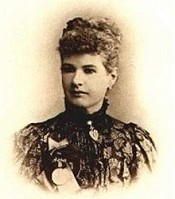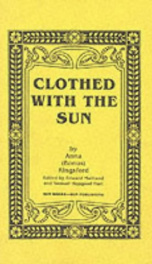Kingsford Anna Bonus

Anna Kingsford, née Bonus (16 September 1846 in Maryland Point, Stratford, Essex – 22 February 1888 in London), was one of the first English women, after Elizabeth Garrett Anderson, to obtain a degree in medicine. Kingsford became known as an anti-vivisection campaigner, and an advocate of women's rights and vegetarianism. She pursued her degree in Paris, graduating in 1880 after six years of study, in order to continue her advocacy from a position of authority. She was the only student at the time to graduate in medicine without having experimented on a single animal. Her final thesis was on the benefits of vegetarianism, which she later turned into a book, L'Alimentation Végétale de l'Homme, translated as The Perfect Way in Diet.[1] Kingsford was also active in the theosophical movement in England, becoming president of the Theosophical Society in 1883. She said she received had insights in trance-like states and in her sleep, which were collected from various manuscripts and pamphlets by her life-long collaborator Edward Maitland, and published posthumously in the book, Clothed with the Sun.[2] Subject to ill-health her entire life, she died at the age of 42 from tuberculosis, reportedly brought on after she was caught in torrential rain on her way to Louis Pasteur's laboratory in Paris.[3] Her life and works have gone virtually unstudied since Maitland published her biography, The Life of Anna Kingsford.[4] Kingsford was born in Essex to a middle class family. By all accounts a precocious child, she wrote her first poem when she was nine, and Beatrice: a Tale of the Early Christians when she was thirteen. Deborah Rudacille writes that Kingsford enjoyed foxhunting, until one day she reportedly had a vision of herself as the fox. [5][6] She married her cousin Algernon Godfrey Kingsford in 1867 when she was twenty-one, giving birth to a daughter a year later. Notwithstanding that her husband was an Anglican priest, she converted to Roman Catholicism in 1872, which he appeared not to mind.[5] Having been left £700 a year by her father, she bought The Lady's Own Paper, and took up work as its editor, which brought her into contact with some prominent women of the day, including the writer, feminist, and anti-vivisectionist Frances Power Cobbe. It was an article by Cobbe on vivisection in The Lady's Own Paper that sparked Kingsford's interest in the subject.[5] In 1873, Kingsford met the writer Edward Maitland, a widower, who shared her rejection of materialism. With the blessing of Kingsford's husband, the two began to collaborate, with Maitland accompanying her to Paris when she decided to study medicine. Paris at that time was at the center of a revolution in the study of physiology, much of it as a result of experiments on animals, particularly dogs, and mostly carried out with anaesthetic. Claude Bernard (1813–1878), described as the "father of physiology," was working there, and famously said that "the physiologist is not an ordinary man: he is a scientist, possessed and absorbed by the scientific idea he pursues. He does not hear the cries of the animals, he does not see their flowing blood, he sees nothing but his idea ..."[7] Walter Gratzer, professor emeritus of biochemistry at King's College London, writes that significant opposition to vivisection emerged in Victorian England, in part in revulsion at the research being conducted in France, which had carried over into England.[8] Bernard and other well-known physiologists, such as Charles Richet in France and Michael Foster in England, were strongly criticized for their work. British anti-vivisectionists infiltrated the lectures in Paris of François Magendie, Bernard's teacher, who dissected dogs without anaesthesia, allegedly shouting at them — "Tais-toi, pauvre bête!" (Shut up, you poor beast!) — while he worked.[8] Bernard's wife, Marie-Francoise Bernard, was violently opposed to his research, though she was financing it through her dowry.[9] In the end, she divorced him and set up an anti-vivisection society. This was the atmosphere in the faculty of medicine and the teaching hospitals in Paris when Kingsford arrived, shouldering the additional burden of being a woman. Although women were allowed to study medicine in France, Rudacille writes that they were not welcomed. Kingsford wrote to her husband in 1874: Kingsford was distraught over the sights and sounds of the animal experiments she saw. She wrote on 20 August 1879: Alan Pert writes that Kingsford was caught in torrential rain in Paris in November 1886 on her way to the laboratory of Louis Pasteur, one of the most prominent vivisectionists of the period. She reportedly spent hours in wet clothing and developed pneumonia, and then pulmonary consumption.[3] Pert writes that she travelled to the Riviera and Italy, sometimes with Maitland, at other times with her husband, hoping in vain that a different climate would help her recover. In July 1887, she settled in London in a house she and her husband rented at 15 Wynnstay Gardens, Kensington, and waited to die, although she remained mentally active.[11] She died on 22 February 1888, and was buried in the churchyard of Saint Eata's, her husband's 11th-century church in Atcham by the River Severn.[3] Her name at death is recorded as Annie Kingsford. On her marriage in Sussex in 1867, her name is also given as Annie Bonus.[12]
do you like this author?
What readers are saying
What do you think? Write your own comment on this book!
write a commentWhat readers are saying
What do you think? Write your own comment on this author!
write a commentBook list

clothed with the sun
Series:
Unknown
Year:
Unknown
Raiting:
2.5/5
Clothed with the Sun is a collection of meditations intended to be practiced both by groups and by individuals. The book is divided into ten sections with each of them containing five meditations. The book should not be read quickly. Readers should spend some time over it and the results would be amazing.
Show more
add to favoritesadd In favorites
Book list

clothed with the sun
Series:
Unknown
Year:
Unknown
Raiting:
2.5/5
Clothed with the Sun is a collection of meditations intended to be practiced both by groups and by individuals. The book is divided into ten sections with each of them containing five meditations. The book should not be read quickly. Readers should spend some time over it and the results would be amazing.
Show more
add to favoritesadd In favorites
What readers are saying
What do you think? Write your own comment on this author!
write a commentif you like Kingsford Anna Bonus try:
readers also enjoyed
What readers are saying
What do you think? Write your own comment on this author!
write a commentif you like Kingsford Anna Bonus try:
readers also enjoyed
Do you want to exchange books? It’s EASY!
Get registered and find other users who want to give their favourite books to good hands!


